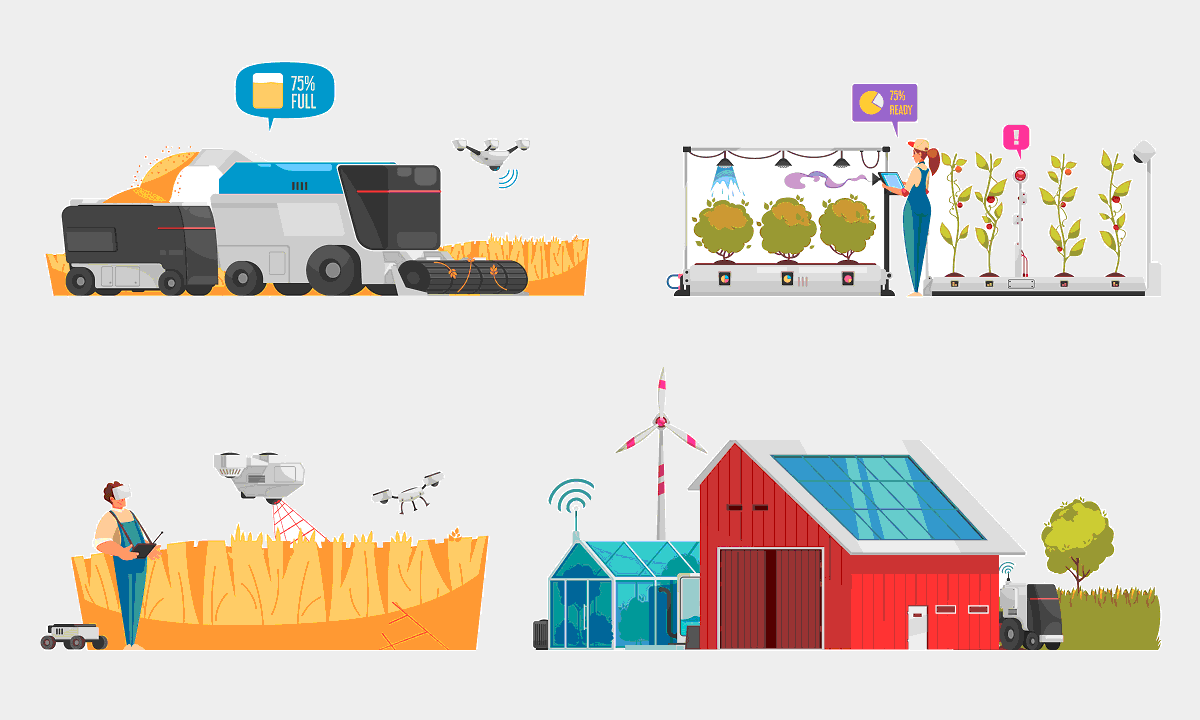
The world's population is growing rapidly, and so is the demand for food. To meet this growing demand, the agriculture industry must become more efficient and productive. This is where digital agriculture comes in. Digital agriculture refers to the use of digital technologies to improve the efficiency and productivity of the agriculture industry. The main goal of digital agriculture is to connect the unconnected, or bring technology to those farmers who have not yet adopted it.
Digital Agriculture: An Overview
Digital agriculture encompasses a wide range of technologies, including precision agriculture, the Internet of Things (IoT), and smart farming. Precision agriculture is a subset of digital agriculture that uses data and technology to optimize crop management practices. IoT is a key technology that enables digital agriculture, by providing real-time monitoring and data collection. Smart farming uses data-driven decision making to improve yields, reduce waste, and increase profitability.
Precision Agriculture: Data-Driven Farming
Precision agriculture involves using technology and data to optimize crop management practices. This includes using sensors, GPS, and satellite data to collect information about soil quality, weather patterns, and plant growth. This information is then used to make informed decisions about seed planting, fertilizer application, and pest control. The adoption of precision agriculture has led to a 15% increase in crop yields in the US, and is being adopted by farmers across the world.
Smart Farming: The Future of Agriculture
Smart farming is the next step in the evolution of digital agriculture. It involves using data and technology to make informed decisions about crop management, reducing waste and increasing profitability. For example, smart farming is estimated to reduce water usage by up to 70% and increase crop yields by up to 20%. Smart farming is becoming increasingly popular among farmers, as it offers a more sustainable and efficient way of growing crops.
Internet of Things (IoT): Connecting the Unconnected
IoT is a key technology that enables digital agriculture, by providing real-time monitoring and data collection. IoT devices, such as sensors and smart irrigation systems, can be placed on farms to collect data about soil quality, weather patterns, and plant growth. This data is then transmitted to a central system, where it can be analyzed and used to make informed decisions about crop management. IoT is helping to connect the unconnected, by bringing technology to farmers who have not yet adopted it.
Agriculture 4.0: The Future of Farming
The future of agriculture is widely considered to be Agriculture 4.0, a highly digitized and automated industry that is sustainable, efficient, and profitable. Agriculture 4.0 involves the use of digital technologies, such as precision agriculture and IoT, to improve the efficiency and productivity of the agriculture industry. It also involves the use of robotics and artificial intelligence to automate tasks such as seed planting, fertilizer application, and pest control. Agriculture 4.0 offers a more sustainable and profitable way of growing crops, and is the future of farming.
Case Studies: The Power of Digital Agriculture
Digital agriculture is transforming the way we grow and manage our crops. Here are a few examples of how it is being used:
John Deere's precision agriculture system: John Deere's precision agriculture system uses sensors and satellite data to optimize seed planting and crop management. This system has been adopted by farmers across the world, and has helped to increase crop yields and reduce costs.
Brazilian government's digital agriculture program: The Brazilian government's digital agriculture program provides free internet access and technology training to rural farmers. This program has increased crop yields by 20% and reduced costs by 15%. By connecting the unconnected, this program is revolutionizing the way that farmers in Brazil approach their work.
In addition to increasing yields and reducing costs, digital agriculture also has the potential to make the industry more sustainable. With the use of IoT and other technologies, farmers can monitor their fields in real-time, detecting and addressing problems before they become major issues. This can help reduce waste and increase efficiency, leading to a more sustainable agricultural industry.
Smart farming, a subset of digital agriculture, takes this one step further by using data-driven decision making to improve yields and increase profitability. With smart farming, farmers can use data from a variety of sources, including weather patterns, soil conditions, and crop growth, to make informed decisions about planting, watering, and harvesting their crops.
The future of agriculture is widely considered to be Agriculture 4.0, a highly digitized and automated industry that is sustainable, efficient, and profitable. By using technology and data to optimize crop management practices, farmers can not only increase yields and reduce costs, but also reduce their impact on the environment.
Conclusion
In conclusion, digital agriculture has the power to connect the unconnected and revolutionize the future of farming. With the use of IoT, precision agriculture, smart farming, and Agriculture 4.0, farmers can improve the efficiency and productivity of their operations, while also reducing waste and increasing profitability. It is important that policymakers, investors, and technology enthusiasts continue to support the development and adoption of digital agriculture technologies, so that farmers everywhere can benefit from the advances in this exciting field.
In short, digital agriculture has the potential to transform the way we grow and manage our crops, connecting the unconnected and revolutionizing the future of farming. Whether you are a farmer, agricultural researcher, technology enthusiast, policymaker, or investor, it is important to stay informed about the latest developments in this field and the impact they will have on the future of agriculture.
Agricultural Science




